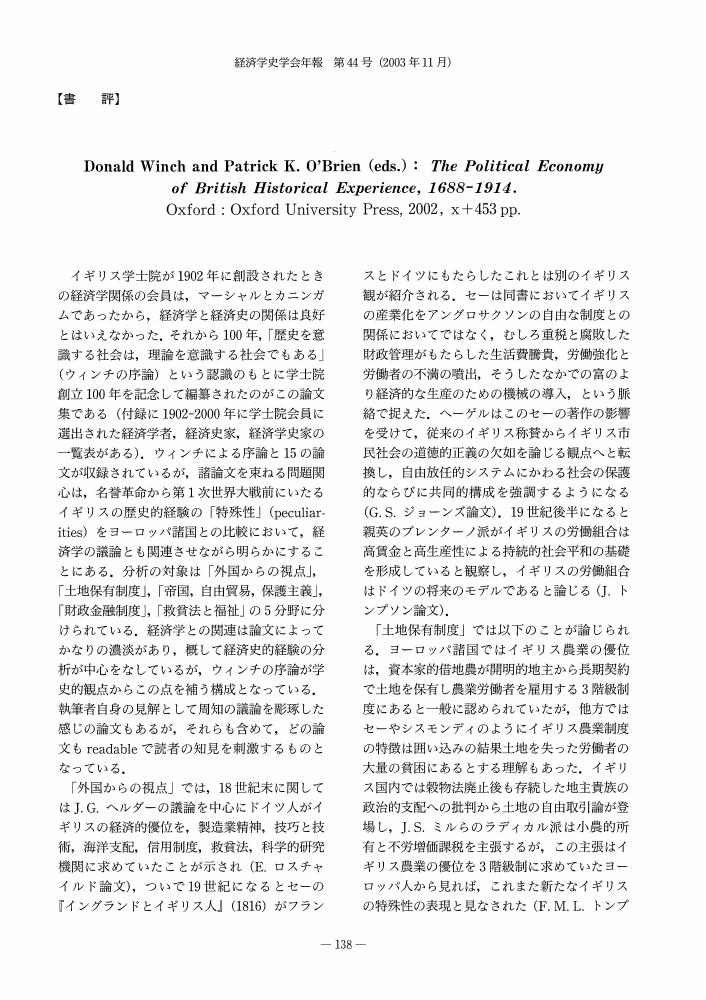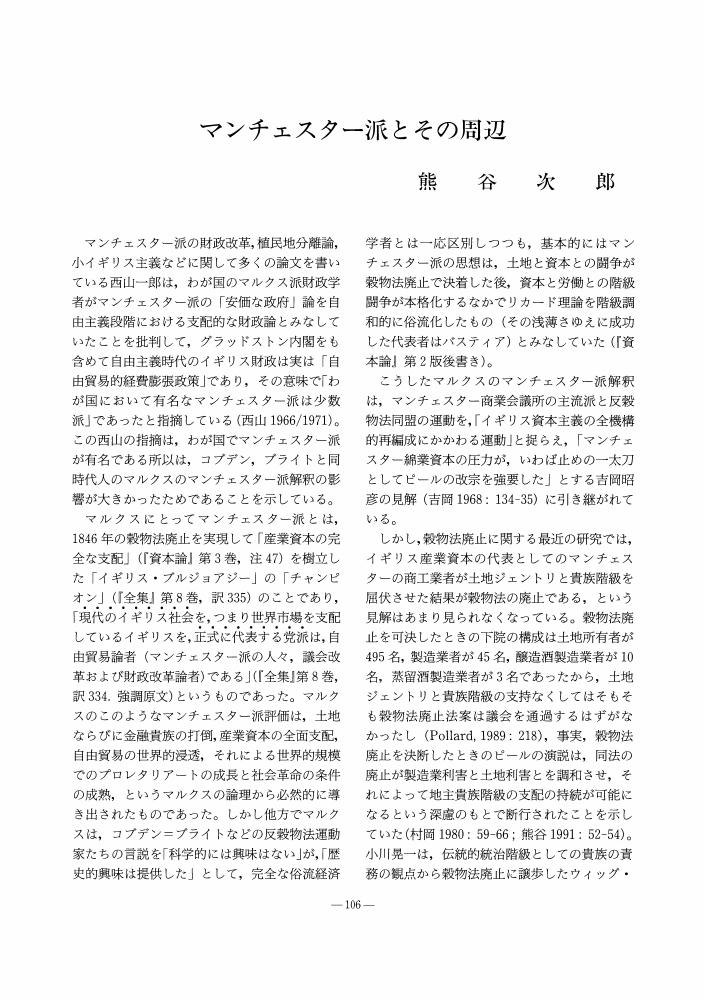3 0 0 0 IR 『書簡集』にみるコブデンの急進的自由主義(上)
- 著者
- 熊谷 次郎
- 出版者
- 桃山学院大学総合研究所
- 雑誌
- 桃山学院大学経済経営論集 (ISSN:02869721)
- 巻号頁・発行日
- vol.60, no.4, pp.67-119, 2019-02
The purpose of this paper is to demonstrate features and significance ofRichard Cobden's liberal radicalism based on the voluminous Letters ofRichard Cobden (4 vols, eds. by Anthony Howe and Simon Morgan, OxfordUniversity Press, 2007-2015). There might be no noticeable difference inhis thought and activities between his writings, speeches and his letters.But letters, as often said, incline to disclose underlying thoughts and feelingof a person in a candidate form. In the case of Cobden, therefore,individualities must to be expressed naturally and plainly in his letters.From this point of view, this paper aims to depict his liberal radicalism inhis unreserved opinions seen in his letters.Cobden's radicalism rooted fundamentally in his unforgiving criticism toaristocracy. According to his view, ever since the Glorious Revolution, theBritish government had been monopolized by aristocracy, and their sonswho were not entitled to inherit the right of primogeniture had occupiedthe upper ranks of the army and navy. As it is their benefits to intervenein domestic policies of foreign countries and in conflicts among nationsacross the world with armed forces, armament expenditures necessarilyincreased and consequently oppressed the well-being of the people with itsburden. Then, Cobden focused his vital concern on the arms reduction inthe national finance, and provided the people with the 'peace dividend'created by the reduction in armament expenditures.From this perspective, Cobden made a frontal attack upon Palmerstonwho deployed the intervention policy and gunboat diplomacy in the East.In his letters, Cobden's remarks on Palmerston and Peel, who resolutelycarried out the abolition of the Corn Law, formed a striking contrast: theformer was an 'impostor' and the latter, 'Adam Smith wrote, Peelpracticed.'(To be continued)
2 0 0 0 OA 服部正治・竹本洋編『回想小林昇』(日本経済評論社, 2011年)
- 著者
- 熊谷 次郎 クマガイ ジロウ Jiro Kumagai
- 雑誌
- 立教經濟學研究
- 巻号頁・発行日
- vol.66, no.2, pp.103-109, 2012-10-20
- 著者
- 熊谷 次郎
- 出版者
- The Japanease Society for the History of Economic Thought
- 雑誌
- 経済学史研究 (ISSN:18803164)
- 巻号頁・発行日
- vol.61, no.2, pp.1-21, 2020 (Released:2020-02-26)
Contemporary British historians are almost unanimous in positing a close relation between the growth of the British economy and the colonial empire after the Glorious Revolution. The formation of the British colonial empire concurrently led to a new turn in mercantile economic thought. During the late 17th and early 18th centuries, the rationale for the concept and significance of the advantages of foreign trade shifted from the “balance of trade” theory to the “balance of labor” or “foreign-paid incomes” one. L. Magnusson, a leading contemporary scholar on mercantilism, attributes the emergence of the latter theory partly to the advent of a new science of trade,2 but he hardly mentions the relation between the theory and the remarkable development of colonial empire trade. Most mercantilists employing this theory, however, assiduously regarded British colonies and dependencies as growing and promising markets for the development of various industries as well as the increase in labor employment in Britain. This paper attempts to illustrate the importance of the theory in the context of both an emerging transatlantic colonial empire and an awareness of the economic crisis of Britain in relation to European competitors. This paper mainly deals with the arguments of Daniel Defoe, Malachy Postlethwayt, Mathew Decker, and Josiah Tucker. By examining their discourses, it shows conclusively that in the mid- and late 18th century, there was a typical mercantile imperialist (Postlethwayt) at one extreme and a so-called free trade imperialist( Tucker) on the other. However, the extreme-position holders shared the view that the colonies and dependencies were indispensable for the development of the British economy and the more extensive circulation of its trade.
- 著者
- 熊谷 次郎
- 出版者
- The Japanease Society for the History of Economic Thought
- 雑誌
- 経済学史研究 (ISSN:18803164)
- 巻号頁・発行日
- vol.48, no.2, pp.125-126, 2006-12-20 (Released:2010-08-05)
- 著者
- 熊谷 次郎
- 出版者
- The Japanese Society for the History of Economic Thought
- 雑誌
- 経済学史学会年報 (ISSN:04534786)
- 巻号頁・発行日
- vol.44, no.44, pp.138-140, 2003 (Released:2010-08-05)
- 著者
- 熊谷 次郎
- 出版者
- 経済学史学会
- 雑誌
- 経済学史学会年報 (ISSN:04534786)
- 巻号頁・発行日
- vol.35, no.35, pp.163-165, 1997 (Released:2010-08-05)
1 0 0 0 OA マンチェスター派とその周辺
- 著者
- 熊谷 次郎
- 出版者
- The Japanese Society for the History of Economic Thought
- 雑誌
- 経済学史学会年報 (ISSN:04534786)
- 巻号頁・発行日
- vol.32, no.32, pp.106-113, 1994 (Released:2010-08-05)
- 参考文献数
- 54
- 著者
- 熊谷 次郎 小林 里次
- 出版者
- 経済学史学会
- 雑誌
- 経済学史学会年報 (ISSN:04534786)
- 巻号頁・発行日
- vol.31, no.31, pp.148-149, 1993 (Released:2010-08-05)
- 著者
- 熊谷 次郎
- 出版者
- 桃山学院大学
- 雑誌
- 桃山学院大学経済経営論集 (ISSN:02869721)
- 巻号頁・発行日
- vol.30, no.4, pp.107-138, 1989-03
- 著者
- 熊谷 次郎
- 出版者
- 社会経済史学会
- 雑誌
- 社會經濟史學 (ISSN:00380113)
- 巻号頁・発行日
- vol.61, no.1, pp.105-108, 1995-05-25





